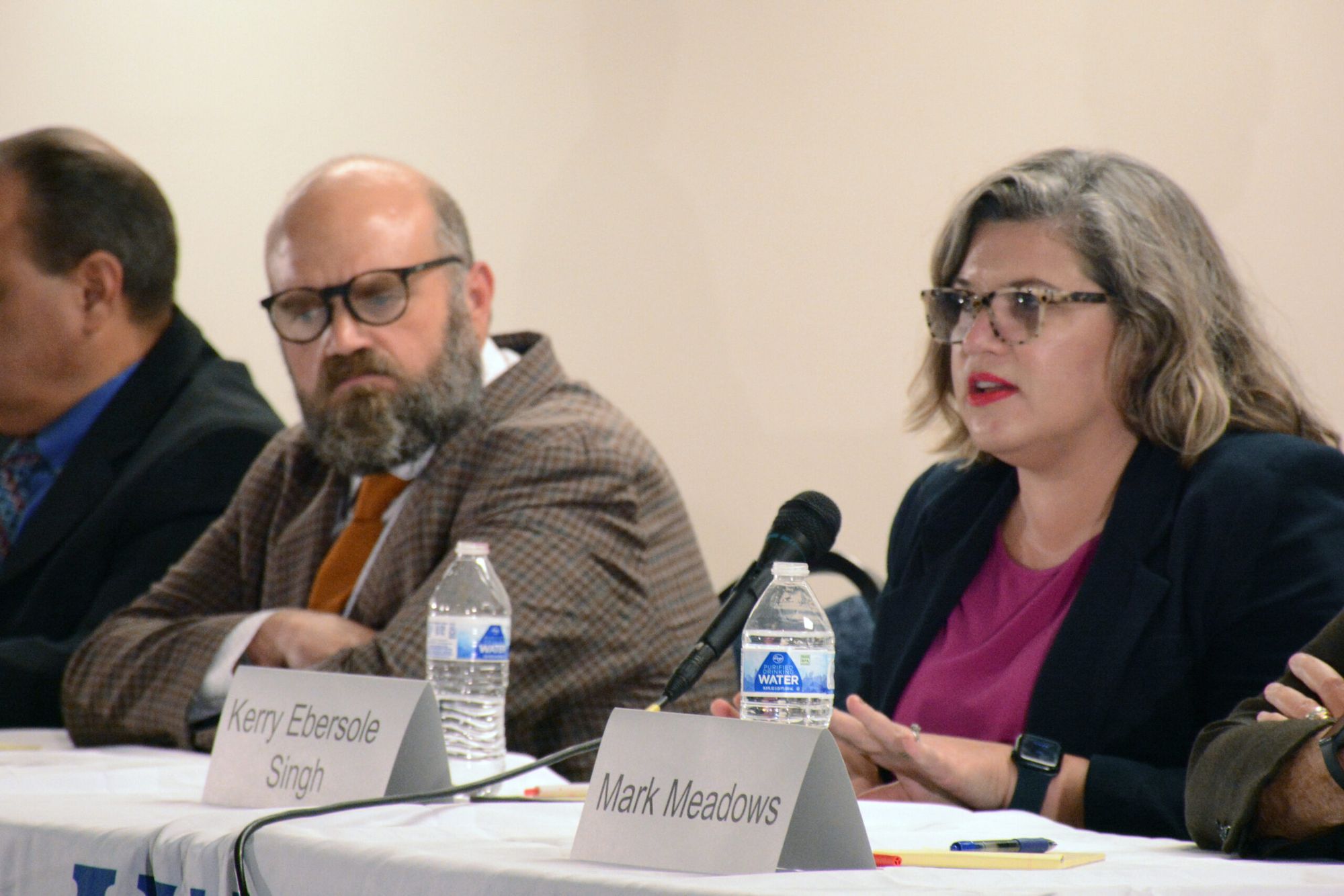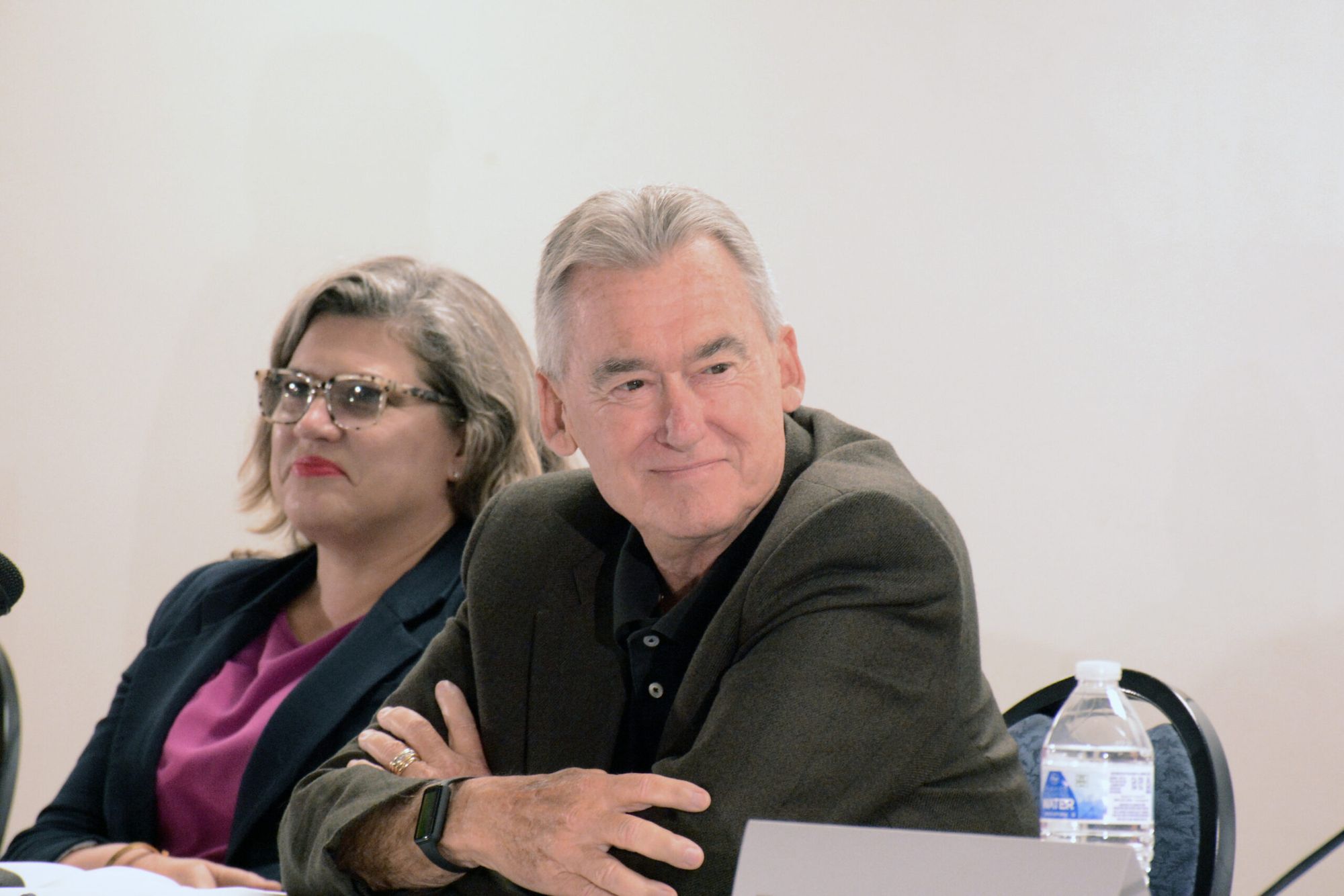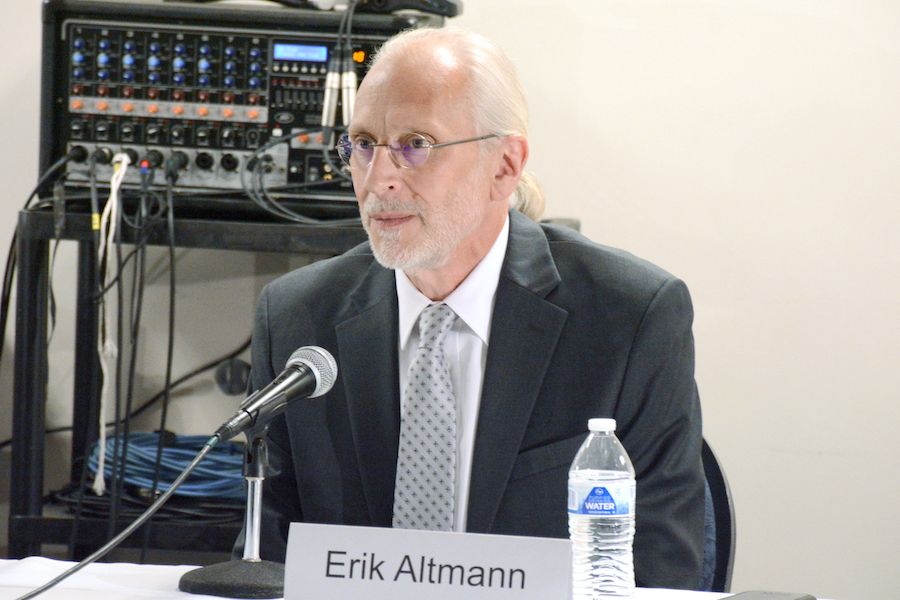Ebersole Singh Runs Way Ahead of Pack; Meadows, Altmann to Return to Council
In unofficial results from Tuesday's election, Dan Bollman narrowly missed out on the third slot. Noel Garcia finished fifth, Joshua Ramirez-Roberts was sixth, Rebecca Kasen seventh and Chris Wardell eighth.

By Lucas Day
Kerry Ebersole Singh ran well ahead of the pack and two familiar faces will be returning to Council as Mark Meadows and Erik Altmann finished second and third in the East Lansing City Council race, according to unofficial results from the Tuesday (Nov. 7) election.
From the field of eight candidates, the top three vote getters were elected to Council. Singh received 3,376 votes, well ahead of the 2,413 votes Meadows received and 2,325 in favor of Altmann. Planning Commissioner Dan Bollman narrowly missed out on the third slot on Council, receiving 2,283 votes and finishing fourth. Fifth place finisher Noel Garcia received 1,536 votes, Joshua Ramirez-Roberts finished sixth with 948 votes, followed by Rebecca Kasen with 903 votes and Chris Wardell with 841 votes.
Additionally, ballot proposals to expand the size of Council from five to seven members and move the swearing-in date of new Council members to January failed. The third ballot proposal that supports ranked-choice voting was approved by voters.
Kerry Ebersole Singh snags a seat on Council following a robust fundraising campaign.
Final campaign fundraising results showed Singh lapping the field, raising a staggering $56,000, not including late or in-kind contributions. It was money well spent, as Singh comfortably won her seat on Council as the top vote getter.
Singh, who is married to state Senator and former East Lansing Mayor Sam Singh, works as the executive vice president and chief talent solutions and engagement officer for the Michigan Economic Development Corporation. Given her background in economic development, Singh pitched herself as the right candidate to help downtown businesses flourish.

In a summer interview with ELi, Singh said she was largely incentivized to run by a desire to ensure that local government works for its residents.
“The moment was recognizing that I still believe that government is here to serve people,” she said. “Wanting to make our local government in service of the people of this community. Recognizing it’s not just experience that people bring, it’s creativity and leveraging opportunities that exist today and collectively. That’s what I bring and I think there’s a moment of need for that right now.”
Former Mayor Mark Meadows was elected once again.
Meadows will be returning to Council after serving two stints on Council from 1995-2006 and 2015-2020.
In 2019, Meadows won reelection by just two votes, but he resigned just months later after Council voted to fire City Attorney Tom Yeadon. Meadows told ELi later that he grew to regret his decision to resign.
Meadows campaigned as a candidate who would be able to stabilize the city workforce and refill vacancies within the city staff.

“Of course, our number one priority is to refill the managerial positions that we’ve lost over this past year,” Meadows said in an interview with ELi earlier this year. “I’ve never seen anything like it. The fact that we’ve never had to deal with this before means that we have to be pretty creative in how we bring people in, make them feel secure and make them want to make their career here in East Lansing.”
Erik Altmann is returning to Council after a narrow defeat in 2019.
On the flip side of Meadows’ narrow 2019 victory was Altmann, who decided not to challenge the results of that race despite falling just two votes short of reelection.
Like Meadows, Altmann is focused on refilling open staff positions and believes his previous stint on Council proves he’s capable of helping to accomplish the task.

“My number one priority is to bring stability back to city government,” he said in a summer interview with ELi. “It’s been four years of upheaval and lack of transparency and people are ready to go back to responsible government.”
Altmann also campaigned on environmental stewardship and finding a solution for severe rain events that have been flooding East Lansing homes. Specifically, he proposed the possibility of finding federal grant money to improve the city’s sewer system.
Ranked choice voting sees support, but Council will stay at five members and keep the current swearing-in date.
Residents rejected two ballot proposals and passed a third. Voters supported ranked-choice voting, as the proposal passed with 2,810 votes for and 2,544 votes against. A proposal that would have expanded Council from five to seven members failed, with 2,782 votes against and 2,599 in favor. The other ballot proposal, which would push the swearing-in date of new Council members back to January, saw 3,226 “no” votes against 2,099 “yes” votes.
Despite the victory for ranked choice voting, it is unclear when the system may go in place in East Lansing elections. Previously, City Attorney Anthony Chubb said the proposal would not be allowed under state law. The ballot initiative also allows Council the option of holding a special election to fill Council vacancies. However, Chubb said this is also not allowed under current state law.
Read more about the three ballot proposals here.
Student turnout was low on election day.
One of the most striking aspects of the 2022 midterm elections were the winding lines that could be seen at Brody Square on Michigan State University’s (MSU) campus, as student voters waited hours to cast their ballots. There was no such scene for this year’s elections.
Without state and federal elections at the top of the ticket to lure students to vote, precincts on the MSU campus did not see much action. In fact, a little after 5:30 p.m., precinct chair Cathy Scott told ELi the Student Union precinct had only seen one vote cast. A little after 6 p.m., the Brody precinct had only ushered in six voters, according to precinct chair Josh Nahum.
While it’s possible some students voted early and Brody was not hosting the satellite clerk's office like it did in 2022 to register voters on election day, it’s evident interest in local elections is not widespread among student voters.
The topic of student turnout has been discussed at City Council meetings recently. Council voted to create a ballot proposal that would move city elections to even years, with many proponents citing increased student turnout as a reason to make the switch. But Gov. Gretchen Whitmer’s office stopped the proposal from reaching voters.
However, it appears there is still a route for the switch to be made. After the announcement from the governor’s office, ELi obtained communications that showed it may be possible for City Council to make the switch via a Council resolution.
More election workers are needed for the 2024 election cycle.
Veteran election worker Gary Beaudoin served as chair for precinct 10 this year. When speaking with ELi a little before 5 p.m. Tuesday, three hours before polls closed, Beaudoin said his precinct had 54 votes cast. The precinct shares a voting location with precinct 9 at Edgewood United Church, which Beaudoin estimated had twice as many voters come through. The likely reason, he said, is because precinct 9 has more full-time residents and fewer students living in it.
Beaudoin said the city had trouble recruiting workers for the Tuesday local election, which made it so some of the workers at his precinct had to do multiple jobs. While the off-year nature of the election kept turnout down and the workload manageable, if the city struggles to recruit election workers in 2024 it could present challenges.
“For a presidential election, they really need a lot,” Beaudoin said.
Beaudoin encouraged those interested in working an election to visit the City Clerk’s office. He said the positions are not volunteer work and can pay around $150 for a day’s worth of work. He added many employers allow workers to take the day off to work elections.
Beaudoin also encouraged voters to visit michigan.gov/vote prior to election day. The site can provide a sample ballot to voters they can use to prepare themselves for election day. Additionally, it can tell voters which precinct they are assigned to. Voters arriving at a precinct they are not assigned to take work time away from election staff, as the workers must search for the voter’s correct precinct location.
Scott said the city anticipated the low turnout at the MSU Union precinct and only sent one computer, a few workers and fewer ballots than it would for even-year elections. She also said this year’s election was a valuable training experience for new workers.
Nahum said he expects a high turnout for the next election and encouraged voters to explore early and mail-in voting opportunities.

Did you know that East Lansing is the only municipality in our region with the kind of independent coverage of local government that ELi provides? If you value this nonprofit news service, please consider making a tax-deductible contribution TODAY. Learn more about our Annual Campaign here, and find all your donation options here. Got a question? Write to us.
